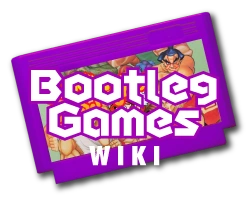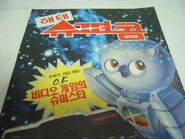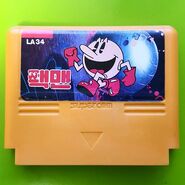(publishing order) |
No edit summary |
||
| Line 33: | Line 33: | ||
*''Crystal Mines'' - as ''Crystal Commando'' (크리스탈 특공대) |
*''Crystal Mines'' - as ''Crystal Commando'' (크리스탈 특공대) |
||
*''[[Menace Beach]]'' - as ''Flying Superboy'' |
*''[[Menace Beach]]'' - as ''Flying Superboy'' |
||
| + | Only Baby Boomer and Crystal Mines have a know Haitai release. It's likely the two others are unfound yet. |
||
| − | It is unclear if Haitai actually distributed the Color Dreams titles beside Baby Boomer. |
||
=== Tengen === |
=== Tengen === |
||
Revision as of 09:54, 19 March 2018
Haitai Electronics (해태전자) was a South Korean general electronics manufacturer and distributor part of the Haitai conglomerate. In 1989, they entered the game market with their own brand named Haitai Supercom (해태 슈퍼콤). Their main activities consisted on distributing Whirlwind Manu catalog and Famiclones under their brand. They put an end to their gaming division after the failure of the PC-Engine in 1993, which they were in charge of distributing.
Activities
Haitai was apparently the official distributor of Whirlwind Manu catalog in Korea. They made their own cover for each releases often featuring Hangul and their logo. The games were sometimes retailed in plastic box with a generic cover and a sticker on the spine with the game title. They also manufactured their own cartridges cases at a point. In the end of 1990, some Japanese publishers alongside with Nintendo sued Haitai for selling their games illegally. Supercom went on to distribute titles licensed in South Korea by Daou Infosys from Tengen then Color Dreams. It seems by the middle of 1991 they had quite reduced their Famicom activities. Their last Famicom activities consisted of an ad on Magic Kid Googoo box and the release of their last clone, the Supercom X-1600 by a subcontractor named Kobo.
Consoles
- Supercom - Rebranded Aaronix AX-9900. Released in October 1989.
- Supercom II - Design based on the previous console. Released in April 1991
- Supercom V-1600 - Smaller and rounded version of the Aaronix design. Advertised in magazines for an April 1991 release but may have gone unreleased in favor of the X-1600 which is identical.
- Supercom X-1600 - Same as the V-1600, came with wired and infrared controllers. 42 built-in games.
- Supercom X-Plus - Distributed by Kobo in 1992 under license from Haitai. Same as the X-1600.
Games
Daou licensed nine titles from unlicensed games developpers from America and had Haitai to distribute at least six of them under the Supercom brand. The first titles released were Klax and Road Runner in the very first weeks of 1991. Skull and Crossbones and Toobin were manufactured in June 1991. The Color Dreams catalog and Shockwave seem to have been released by July 1991 too.
American Game Cartridges
- Shockwave - as Octagon (옥타곤)

Supercom logo.
Color Dreams
- Baby Boomer
- Challenge of the Dragon - as Black Dragon (블랙 드래곤)
- Crystal Mines - as Crystal Commando (크리스탈 특공대)
- Menace Beach - as Flying Superboy
Only Baby Boomer and Crystal Mines have a know Haitai release. It's likely the two others are unfound yet.
Tengen
- Klax
- Road Runner (로드러너 X)
- Skull & Crossbones - as Eye-patch Jack (애꾸눈 짹)
- Toobin
Zemina
While Supercom may or may not have published it, their logo is definitely featured on front of the box.
- Magic Kid Googoo (Unconfirmed)
Trivia
- During November 1990, Haitai got sued by a group of Japanese publishers for distributing illegal copies of Famicom games, the case was settled out of court.
- Haitai is still in business today, but only the food branch remains.
- The games licensed from Color Dreams all feature a Hangul title screen (except Baby Boomer) and updated copyrights with the rest of the game being unchanged. As for the Tengen games, only the copyright was changed for Skull & Crossbones and Toobin.
- All games licensed from Tengen (except Road Runner, which probably hasn't been found) and Baby Boomer had a second release with a different cover, lacking the Haitai and Supercom logos.



